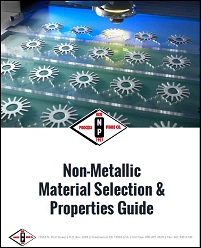Engineers today know full well of the growing need for specialized and custom materials for stamping. As applications have become more specialized, so too have the materials and configurations available for non-metal stamped products.
With the great array of advancements being made across industries, new applications and processes are increasing the demand for alternatives to traditional metal stamped products. Along with this demand comes the need for new materials in fabrication procedures.
Here are some common options for materials to use in the manufacture of non-metal stamped products.
Vulcanized Fibre
Vulcanized fibre has a number of characteristics making it useful for various applications. It is useful in numerous industries due to its being composed of primarily natural cellulose.
Vulcanized fibre i s also beneficial as a primary or secondary material. It has good strength, high durability, and flexibility. It is easily formable and machinable without splintering or cracking, while also being lightweight and having high tensile strength.
s also beneficial as a primary or secondary material. It has good strength, high durability, and flexibility. It is easily formable and machinable without splintering or cracking, while also being lightweight and having high tensile strength.
Adding to its versatility is the fact that it is high resistance to solvents and chemicals like oil and grease. The five distinct available grades are commercial, electrical, trunk fibre, bone fibre, and wood laminating, each of which are used for a range of applications across industries.
Thermoplastics
The term “thermoplastics” is used to refer to any non-metallic polymer, or a plastic that will structurally change when subjected to pressure and high temperature. Thermoplastics become less solid and more gel-like at higher temperatures.
These characteristics make it more malleable and ideal for processes like injection molding, a cost-effective and fast process for high-value thermoplastic components. Along with light machining processes, thermoplastic components can be manufactured to be almost as precise as metal components, but faster and with better consistency.
Thermoset Plastics
Thermoset plastics, unlike thermoplastics, have a set strength profile that does not change with temperatures. They are primarily used in high heat applications, such as electrical equipment, insulation, appliances, and printing systems. They are handled similarly to metals and metal alloys during the manufacturing process.
Learn more in New Process Fibre’s Material Selection Guide
New Process Fibre has over 85 years of experience working with alternative methods for metal stamping. That is why we are proud to present our Non-Metallic Material Selection & Properties Guide. Inside, you will find comparison tables, computability charts, and much more detail about the materials presented here. Download your free copy today, and let us know now we can help you with your non-metal stamping needs.


